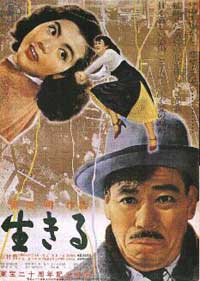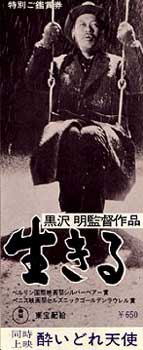 Kurosawa's best film of many great may well be Ikiru (To Live!, 1952), a film that does for quietude what Seven Samurai (1952) did for spectacle.
Kurosawa's best film of many great may well be Ikiru (To Live!, 1952), a film that does for quietude what Seven Samurai (1952) did for spectacle.
In thirty years, section chief Kanji Watanabe (Takashi Shimura) had never minssed a day's work. For the first time he will take a day off to see the doctor, to learn he is has but a short time to live.
Watanabe has already been dead for decades, having done nothing with his life but warm the section chief chair. He stamps paperwork & that's it. He's a link in a government bureaucracy that serves scarcely any useful purpose.
Facing death as a man who has never mattered for a thing, he at first strives for some degree of pathetic liberation & spends some of his precious remaining time on earth entering the club life, with his new friend, a decadent author, as his guide.
Dance clubs, drinking establishment, a stripper club, a boogie woogie bar, he spends one great night in the world, the first in his life. He makes friends & for this moment in his life, he actually lives.
But none of it is truly rewarding, & at one point the Watanabe's intense sadness manifests in his tear-streaked face as he spoils the festive evening by singing an old love song from the 'teens: "Life is brief/ Fall in love young maidens/ Before your raven tresses fade."
This moment may well be the most tragic ever captured on film.
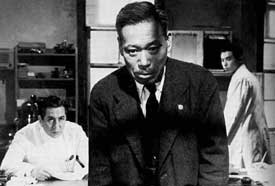 At his job, no one knows he's dying, but they know he hasn't been warming his seat as reliably as he had for the prior three decades.
At his job, no one knows he's dying, but they know he hasn't been warming his seat as reliably as he had for the prior three decades.
When he suddenly takes renewed interest in his work, it is as though he were an entirely different Watanabe than they had previously known.
For a long time departments have been passing the buck of a sewage pit that impoverished families want drained & filled for use as a playground.
The sewage department passes it to the health department which passes it to pest control due to the mosquitos & they pass it off to the highway authority & so on round & round.
For the first time in his life Watanabe decides to achieve something. He'll be dead in three to six months, so that's how much time he has to get the sewage cleaned up & a payground established.
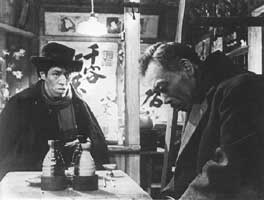 The beauty of this tale is strictly in the acting. Takashi Shimura was one of the world's greatest of great screen actors. The beauty of this tale is strictly in the acting. Takashi Shimura was one of the world's greatest of great screen actors.
Everyone knows him as the leader of The Seven Samurai, but if anything, his performance in Ikiru is even more miraculous, as here there is no "crutch" of overt & obvious heroism & high action to carry the tale to its conclusion.
The script, the cast, the amazing design of hte film, all come together to become vastly more than in total than in its parts. And if I were in a picayune mood, it would still be impossible to find even token fault with any moment of this movie.
Shimura's expressive face has the capacity for revealing an almost superhuman sorrow. In his face & his body language he becomes the personification of loss, sadness, & defeat. Throughout my life I've seen this film two or three times a decade, & it re-establishes itself each time in my top-ten list of the best in world cinema, & Shimura at the very peak of any list of extraordinary actors.
As Watanabe struggles against the bureaucracy & barely meets with success in his race against death, this meaningless man becomes a true heroic figure not in the world of action-packed surreal adventure or sword duels, but of stamina, devotion, & compassion in a discompassionate world.
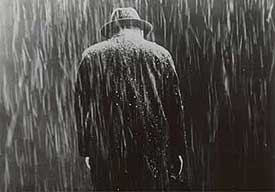 The portrait Kurosawa creates of Watanabe's last night on earth, singing that old song of young maidens in the playground, seated in a swing, as snow covers his hat & shoulders, well, the police officer at the end of the tale said it best: "That song of his touched the depths of my soul." The portrait Kurosawa creates of Watanabe's last night on earth, singing that old song of young maidens in the playground, seated in a swing, as snow covers his hat & shoulders, well, the police officer at the end of the tale said it best: "That song of his touched the depths of my soul."
Periodically I come upon this recurring problem: Having praised many a film over time, it is hard to find different words to express a vastly higher degree of excellence. This week I happened to have enjoyed the hell out of Fido (2006), the story of a boy & his pet zombie. How can words that laud Fido be the same words that laud Ikiru?
There are few films that insure cinema will always be provably a high art form in addition to being entertainment. Among those few I would place Roberto Gavaldon's Macario (1960), Marcel Carne's Children of Paradise (1945), Boese & Wegener's Der Golem (1920), Federico Fellini's La Strada (1954), Luis Bunuel's The Exterminating Angel (1962), Wojciech Has's The Saragasso Manuscript (1965), Michael Curtiz's Cassablanca (1942), Jean Renoir's The Grand Illusion (1937)...
Whatever is to you just about the best film you've ever experienced, Ikiru will match or surpass it.
copyright © by Paghat the Ratgirl
|
